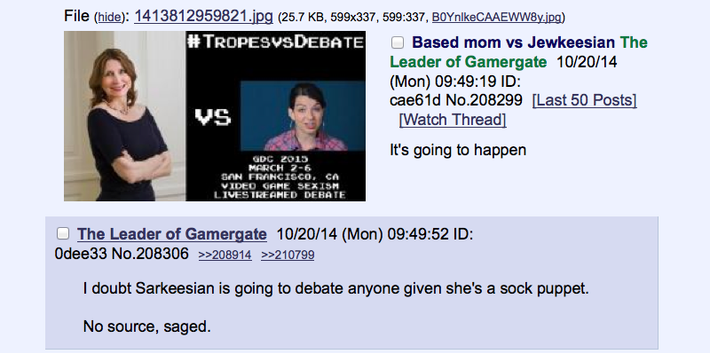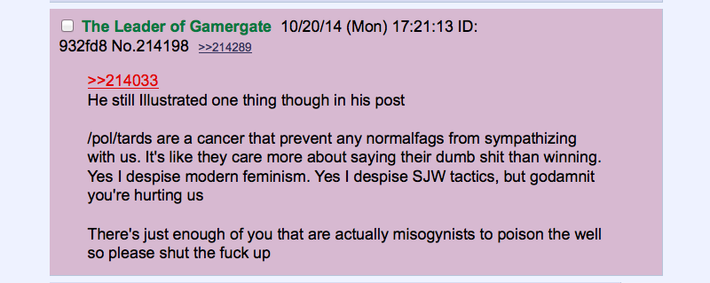
If I, a journalist, want to learn more about the National Association for the Advancement of Colored People’s views on the black-white college gap, or the National Rifle Association’s on “concealed carry” laws, a straightforward path lies before me: I can call or email these organizations, or consult the voluminous history of statements their officially appointed representatives have made in newspapers, press releases, and elsewhere.
If, on the other hand, I want to learn more about #Gamergate, the once-niche “movement” that has burst into mainstream awareness the last couple weeks, things get a bit trickier — almost mystical. I basically have to play the part of a scared teenager in a pitch-black bathroom chanting the name of some dead Sumerian god into the mirror, equal parts terrified and titillated. That is, I have to go on Twitter and post something with the #Gamergate hashtag and wait to see what pops up in response.
Whenever I do so, I find that gamergaters are unhappy with my representation of their movement; they feel I am fundamentally misunderstanding it. The couple of times I wrote about Gamergate and argued that it certainly seems to have a lot to do with discomfort with change in the gaming industry, for example, I was inundated with angry tweets from the movement’s indignant supporters. You don’t get it, they insisted. This is about ethics in journalism. They often pointed me to long, pretty involved conspiracy theories that seemed to claim, among other things, that various gaming websites were colluding to attack the “gamer” identity they held so dear, or that an indie developer named Zoe Quinn had slept her way to positive coverage. All they were really interested in, they insisted, was in gaming journalists acting in a responsible manner.
Okay, fine, I thought. Let’s give this idea a shot. So where should I go to see the real Gamergate?
Gamergate’s Twitter denizens suggested a few windows to peek into: KotakuInAction, a subreddit that acts as something of an unofficial HQ (one of many — a problem I’ll return to) for gamergaters; 8chan’s Gamergate board, which has served as another GG staging area since 4chan shut down discussion of GamerGate following threats and harassment (a whole other conspiracy theory that could take several articles to explain); and a Google Hangout session with real-life gamergaters I was invited to take part in by a self-proclaimed advocate of the movement.
So I clicked into these venues with what I hope was an open mind, wondering if they’d alter my view that Gamergate is much more a reaction to the influence of feminism and progressivism in gaming than a justified response to genuine ethical issues. Instead, after being exposed to what is ostensibly the true-blue bleeding heart of GamerGate, I found that my views of it had only hardened.
When I visited KIA on Sunday, for example — again, the subreddit I was explicitly instructed to visit if I wanted to see the real Gamergate — three of the top six posts were about the indie developer Brianna Wu (a subject of harassment and threats), the feminist commentator Anita Sarkeesian (ditto), or the “social-justice warriors” (SJWs) that Gamergaters love to ridicule for polluting gaming with their “radical” ideas. Keep in mind that merely mentioning Wu or Sarkeesian or Quinn to many Gamergaters lights a white-hot fury in them — This is not about them, they will insist, ad nauseam, to the point that the more clever of their lot have started referring to them not by name but by the label “Literally Who” (or LW) 1, 2, and 3 (as in “I literally have no idea who that is”).
But despite the fact that Gamergate “isn’t about” feminists or LWs or SJWs in general, all these figures and subjects have a weird, pesky habit of continuing to pop up wherever gamergaters assemble. Take some of the posts on 8chan from this very afternoon:



(For those keeping track at home, that’s 8chan’s gamergaters referring to Sarkeesian as Jewkeesian. Cute!)
Then there was the Google Hangout. I was invited by Troy Rubert, a.k.a. @GhostLev. Just about everyone in there who spoke openly expressed how mad and frustrated they were that progressive politics and feminism were impinging on gaming, which they saw as an area they had enjoyed, free of politics, forever. They were extremely open about this. A day or so later, another gamergater, @Smilomaniac, asked me to read a blog post he’d written about his involvement in the movement in which he explicitly IDs as anti-feminist, and notes that while some people claim otherwise, he thinks GG is an anti-feminist movement. (He later added, via Twitter, “You’re not distinguishing between feminism and 3rd wave radscum which is what ‘we’ dislike ;/ ” — the clarification is appreciated.)
I believe Smilomaniac. I also believe the various Reddit and 8chan posts and the folks in the Hangout; I think Gamergate is primarily about anger at progressive people who care about feminism and transgender rights and mental health and whatever else is getting involved in gaming, and by what gamergaters see as overly solicitous coverage of said individuals and their games.
And here’s the thing: That’s fine! It’s an opinion I happen to disagree with, but it’s a coherent, concrete viewpoint. Say what you will about the tenets of anti-progressivism, dude, but at least it’s an ethos.
Let me address Gamergate advocates directly for a moment: Right now, journalists trying to be fair-minded about your movement simply can’t win. Again, if I’m arguing with someone from the NRA or the NAACP or some other established group, I can point to actual quotes from the group’s leadership. With you guys, any bad thing that happens is, by definition, not the work of A True Gamergater. It’s one of the oldest logical fallacies in the book.
So what is Gamergate “really” about? I think this is the sort of question a philosopher of language would tear apart and scatter the remnants of to the wind, because it lacks any real referent. You guys refuse to appoint a leader or write up a platform or really do any of the things real-life, adult “movements” do. I’d argue that there isn’t really any such thing as Gamergate, because any given manifestation of it can be torn down as, again, No True Gamergate by anyone who disagrees with that manifestation or views it as an inconvenient blight from an optics standpoint. And who gets to decide what is and isn’t True Gamergate? You can’t say you want a decentralized, anonymous movement and then disown the ugly parts that inevitably pop up as a result of that structure. Either everything is in, or everything is out.
Faced with this complete lack of clarity, all I or other journalists can do, then, is journalism: We ask the people in the movement what they stand for and then try to tease out what is real and what is PR. And every, every, every substantive conversation/forum/encounter I’ve had with folks from your movement has led me to believe that a large part of the reason for its existence is discomfort with what you see as the burgeoning influence of so-called social-justice warriors in the gaming world.
This is only going to be a real debate if you guys can cop to your real-life feelings and opinions. You should have a bit more courage and put your actual motives front and center. Instead, because some of you do have a certain degree of political savvy, as is evidenced whenever gamergaters on 8chan and elsewhere try to rein in their more unhinged peers (no, of course not every Gamergate proponent is a harasser), you’ve decided to go the “journalism ethics” route.
Unfortunately, that sauce is incredibly weak, as has been documented capably elsewhere; to the extent there are ethical issues at play here, they are very small-bore. There was no Kotaku review of “Depression Quest,” the supposed “scandal” of journalistic impropriety that allegedly touched all this off, and fair-minded journalists will see through that line of attack right away since Quinn was receiving hate for the game long before her boyfriend posted his jeremiad.
Journalists donating to crowd-funding campaigns, which is another major Gamergate complaint? I bet if you asked 100 journalists you’d get 100 different opinions on whether this should be inherently off-limits (personal take is that it isn’t, but that journalists should certainly disclose any projects to which they donate and shouldn’t report on them).
Collusion to strike at the heart of the gamer identity? Conservatives have been arguing that liberal journalists unfairly collude forever — I was on the “Journolist” that people wrongly claimed was coordinating pro-Obama coverage when really what we were doing, like any other listserv of ideologically like-minded people, was arguing with ourselves over everything. No: What happened was Gamasutra ran a very controversial column by Leigh Alexander, that column went viral, and a lot of people responded to it — and to then-recent high-profile harassment episodes — at the same time. This had nothing to do with cross-outlet collusion to insult gamers, and a close, honest look at the posts and articles in question will reveal that. When everyone’s writing about the same thing, that’s because the thing in question is getting a lot of discussion, which Alexander’s column and the incidents that precipitated it did.
You guys know as well as I do that a movement based on the stated goal of regaining gaming ground lost to feminists and so-called SJWs would not do very well from a PR perspective. But you’re in a bind, because other than that, the ethics charges are all you’ve got and they happen to be (1) 98 percent false; (2) complicated to follow for the layperson; and (3) pretty clearly a ruse given the underlying ideology of the folks pushing this line forward.
So I’d make a call, one last time, for honesty: Stop pretending this is about stuff it isn’t. Acknowledge that you do not want SJWs in gaming, that you want games to just be about games. Again: I disagree, but at least then I (and other journalists! you do want coverage, don’t you?) could at least follow what the hell is going on. If your movement requires journalists to carefully parse 8chan chains to understand it, it gets an F- in the PR department. You guys need to man and woman up and talk about what’s really on your mind, or stop whining about “biased” coverage and/or blaming it on nonexistent media conspiracies.
(This article was adapted from a Reddit post published Sunday.)




